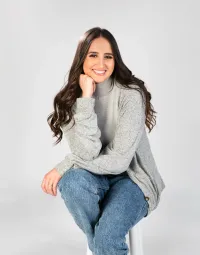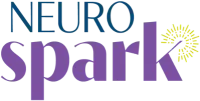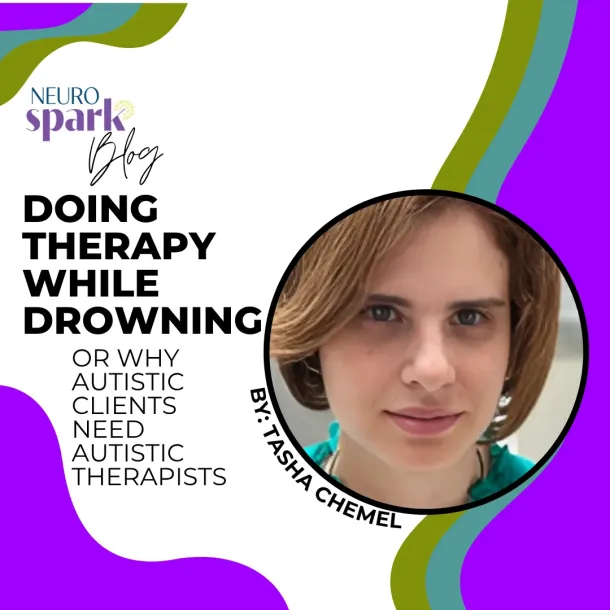A Neurodivergent Therapist Reflects on Her Own History with Therapy and Treatment

Trigger Warning: self-harm, substance abuse, “troubled teen” industry discussion
I can honestly say I have a love/hate relationship with my history with therapy.
Here’s how it all started: 12 years old. My middle school gym teacher was concerned that while the other girls were happily chatting in the locker room changing for gym class, I was hiding in the corner looking (and feeling) miserable. I did not want to participate in any of it. The teacher reported to my school guidance counselor, who then reported to my parents, that I was exhibiting signs of depression. That is how I entered the mental health world, and literally never left.
The truth is, I was in a chronic state of complete and utter overwhelm. I was an unidentified neurodivergent child who was being unfairly held to neurotypical expectations. It is now blatantly obvious to me that the social group aspect of “physical education” classes, mixed with all the movement that was always difficult for my body to coordinate, let alone cope with, combined with the added layer of navigating the landscape of clique-ish middle school girls who also bullied me, it is no wonder I was miserable. Literally the equivalent of social and sensory torture for me. I was unknowingly protecting myself from that and keeping myself safe. Guess what these self-protective measures were labeled as? Oppositional and defiant. A label that stuck with me and one that I internalized for many years.
We then begin with my very first therapist ever. I can distinctly remember only one thing from my time with her— she spent many sessions talking to me about her life story. What did I get out of it? She reminisces about her time studying theater in London in her early 20s. Lol. This is probably when I learned to mask by pretending I was listening to or cared about her personal stories during my therapy time. If I (understandably) didn’t want to go to the session, guess what that’s called? Treatment noncompliance. Once again, a label that stuck with me for too long.
Around age 13, I started self-harming. I had big emotions and profound distress, without the language to describe why or how much I was struggling, despite everything appearing good on the outside. Seeing external injuries reflect my internal pain and distress was how I was able to express it. It was NOT attention-seeking behavior. I actually despise how common that terminology is used in the settings I’ve worked in. It was also a way to exert a sense of control when life around me was so out of my control. I see this in my own autistic clients (with significant support needs), too, where I notice that if a staff member makes them feel like they have no choices or autonomy, THAT’s when, a lot of time, the headbanging or other self-injurious behavior starts. I see the frustration and helplessness in their eyes, and I also see what triggered them. It’s their way of saying THIS IS NOT OKAY. I know how that feels. It’s extremely distressing to feel forced to conform to a box not designed with our needs and differences in mind.
This same neurotypical box was also not working for me academically, either. Sit down at your desk and listen to the teacher, talk and raise your hand and ask questions but don’t interrupt and don’t ask to go to the bathroom too much, and come prepared to class, remember your schedule, and come to class on time, and remember your homework and complete assignments by the deadline, and engage with topics you are not interested in, and retain information and take tests and present in front of the class and do group work and on and on and on, every single day rinse and repeat. I checked out. Hard. I was so overwhelmed and so overstimulated. Being so misunderstood, isolated, and lonely actually did lead to depression and hopelessness. Self-fulfilling prophecy. This constant frustration turned into anger, so I rebelled. Also, a self-fulfilling prophecy. I hated this institutionalized environment. It didn’t make sense to me. I was so stressed that I actually started dissociating. I just wasn’t able to be present in that setting. I was zoning out into nowhere. Long story short, welcome psychiatry into the picture. Diagnosed with ADHD, ODD, and depression. Put on stimulants and SSRIs.
Soon after, I discovered marijuana and alcohol. I quickly realized that by using substances, I could feel relief from the suffering that I experienced. Instantly. It felt good, and my meds didn’t. I needed relief, so I began self-medicating. It was my new coping strategy and a way to have a group of friends who shared a common interest. It served as an external thing that I could use to regulate, since self-regulation did not exist for me at the time. Alcohol when I needed to go low, and marijuana when I needed to go high. Suddenly, my mental state and mood were in my own hands for once, or so I thought.
One day, the school nurse discovered my self-harm scars, and I was sent to the principal’s office, and they required me to immediately go to the psychiatric ER to get cleared to go back to school. The hospital recommended psychiatric IOP. And that was the first time I was removed from the school setting. Therapy groups all day, in a quiet place, with lots of arts and crafts, with only a dozen or so peers. It was actually a welcome break from the crazy demands of high school. There was only one problem—my drug test came up positive. Their policy is that immediately you get discharged from the psych IOP and transferred to the substance abuse IOP. No choice in the matter. I was lumped in with a bunch of kids who had serious addictions to hard drugs. This was a much rougher and tougher setting with a much different population than I was exposed to at the other program, where we basically colored all day and talked about feelings. Here, I was told that I wouldn’t amount to anything. Here, I was told that I would die or end up in jail. Here, I was told I was making excuses and lying. This was a shocker to me. Again, I was just trying to cope. I had no intention of being forced into “recovery.” I began resenting everyone who tried to control me, so I pushed back even more. There was no way that I would conform to this. Three positive tests later, the policy is that you get sent to inpatient treatment.
Enter my very first rehab. Exposed to people fighting, stealing, lying, and scheming, suddenly I’m in a program learning to cheek my meds and snort them later. I just wanted to go home. Keep in mind that I still could not return to school unless I completed a program. I hated the system I landed in. I hated all authority figures. I was told some really negative things that became part of my self-image. I wanted to escape. So I did, about 13 times, literally. Thirteen different programs in a span of a few years. The final one, it seemed they had nowhere left to put me, so I finally came home. This is when my substance abuse spiraled. I had my freedom now, and I was going to do my own thing. I was 16. I also hated my parents at this point. I was drinking to blackout levels and escalating to the use of uppers, benzos, and psychedelics. That time at home was short-lived. My parents were tired.
Soon, I was mandated to a “therapeutic boarding school” in upstate New York. I put that in quotes as the school was not therapeutic whatsoever and actually later got shut down for abuse. That’s a whole other story that I will be writing much more about. But there I was, somehow landed in the “troubled teen” industry. Their rules were absolutely bogus and oppressive. We weren’t allowed to hug. We weren’t allowed to interact with the opposite sex. We weren’t allowed phones or any technology. We weren’t even allowed to listen to MUSIC. It was highly religious-based, and the opinion was that music was secular and would corrupt us. The only music we listened to was at mandatory, daily religious services. All my favorite band t-shirts were taken from me at intake. All forms of expression were taken from me. I wrote lyrics to my favorite songs in my notebook so I didn’t forget them and could read them to myself when I needed comfort. That was found and confiscated. The list goes on, truly. There were many more horrific practices there, and I’m glad they got shut down.
Anyway, with all the extraordinarily mean and cruel staff who would psychologically abuse me, I had once-a-week counseling with a social worker named Rochelle. I stepped into her office, she closed the door, and said, “Don’t tell anyone, but what song do you want to listen to?” She would play my favorite songs during my weekly sessions with her. I would close my eyes and be enveloped in a sense of comfort. I felt like I was human again. She had her own paintings on the wall, low light, and sensory items. When I tell you, her small act of noncompliance, allowing a child to hear music, was single-handedly the most healing, therapeutic,and most appreciated gesture that I experienced in my entire stay there. It quite literally kept me going. She represented a bright beacon of light and hope to me. She represented a change to the hundreds of therapists or providers that I had worked with at that point. I didn’t know it then, but I really do think it was there that I decided that I would be a social worker. I wanted to be that change for people, too. I knew I was different, and I wanted to BE that difference for others. I still do.
I left there when I was 18 and moved with my father. He believed in me, supported my independence, and did not feel the need to exert any control on me as I was entering adult life. This approach was what I needed all along. Turns out, I could accomplish a lot when things are on my own terms. I worked, I went to school, and kept to myself mostly. I did things that I wanted to do. I controlled my classes and schedule to be mostly mid-day or evening when my brain works at its best. Taking courses that I was actually interested in. One of my classes in my undergrad psychology program had a “service learning” component where you had to volunteer time at a local agency in order to get credit for the class. Somehow, I ended up at an arts program for people with disabilities. I am so glad I did.
After graduating, I got a job at a nonprofit agency providing individual support services for intellectually and developmentally disabled youth. It soon became very clear that this was where I belonged. Those kids and I had such natural, easy connections. It was like we spoke the same unspoken language. I felt at home with this population, and I was really good at what I did. It brought me a lot of joy, even though I was still struggling with my own unidentified and unsupported differences that were extremely difficult to manage. It actually got so unmanageable at one point that I made the decision to stop all substances, which was over 5 years ago, and I haven’t turned back.
I decided to get my Master’s in Social Work. On this topic, I always like to share this story as an example of how untrained and ill-equipped so many providers are: in my entire graduate program, in only one of my assessment and diagnosis classes, in one day, during one lecture, for MAYBE 10-15 minutes of that one lecture, did we learn about autism. And then we moved on to the next thing. 15 Minutes. At most. No exaggeration.
I advocated to my social work department to let me take a special track that was offered by another department as part of my degree. After much fighting, it was granted. I took specialized courses and a graduate certification program in Developmental Models of Autism Intervention. Both my internships were with autistic and neurodivergent kids. Both internships focused on mental health for these kids. This is hugely important. I can scream at the top of my lungs about mental health and neurodivergence. It’s necessary. It’s not talked about enough. There are millions of people not getting the help they need and deserve. There are millions of kids who end up in systems that do not serve them. And those turn into adults who are forgotten and funneled through even more systems that don’t support them. It’s unacceptable and it makes me angry. There are individuals who don’t even care that this is happening. I care.
I always tell people who are looking for a therapist, please do not give up. It could take dozens and dozens of providers until you find one that understands. It took me nearly 15 years to find one. I think it’s clear I had some pretty harmful “helpers” in my time. It was only recently that I found a person who is neurodivergent, and the difference I feel is astronomical. To feel truly understood, seen, heard, and accepted, with no judgment, is the most healing phenomenon. It makes a big difference. I show up to the session telling him, “I don’t know why I’m so upset right now,” and he says, “Well, you were masking all day.” Simple. To the point. And just so accurate. My former therapists might have prompted me to evaluate and transform my negative thought patterns or beliefs. I really don’t need all that. I just needed someone to see me. All this time, that’s what I needed. I don’t want to have to explain anymore why I get overwhelmed by things that neurotypical people do every day with ease. It doesn’t make me broken, sick, or in need of fixing. Any of my former therapists might see that as a deficit or a “symptom.” A neurodiversity-affirming provider just knows how it is and how it feels, and believes in my ability to achieve things anyway.
I received no help from any of these doctors, therapists, or psychiatrists to understand who I am. If I hadn’t gone through my own process of self-discovery and stepped into my neurodivergent identity with radical self-acceptance, I still may be that girl who feels isolated, hopeless, and angry at the world for mistreating me. Now I’m angry FOR all the people like me who have also not received the care they deserve. But I’m also hopeful for them that I can share that there IS another way. There is an authentic, happy, successful, supported, and meaningful life out there. It doesn’t have to be this way. It does take a lot of strength and resilience (and resources) to tough it out until you finally land on the right formula. That process deserves a lot of credit. Having to work a hundred times harder and wait a hundred times longer just to get the right help that has been missing this whole time. And when it happens, I promise, it will be a sigh of relief. It finally feels like I have arrived where I am supposed to be, after stumbling my way through with nowhere to turn. There is somewhere to turn, and that’s the neurodivergent community. This community elevates where others oppress. We lift each other up and will affirm you and believe in you even when others don’t. NeuroSpark Health was named to celebrate individual differences, joy, and passion, but there’s also a really beautiful spark when one neurodivergent person connects with another. It’s a powerful force. I am lucky enough to have it, and I will not keep it to myself. This spark needs to be shared.

Dani Rodwell, LCSW
One Spark Can Light a Fire
Diagnosis can be the catalyst for significant momentum. It can represent a turning point for your life, where you can move forward equipped with new knowledge about yourself and a new framework to guide you in your journey.
A formal assessment provides an incredible opportunity to gain knowledge about who you are and how you see the world.



